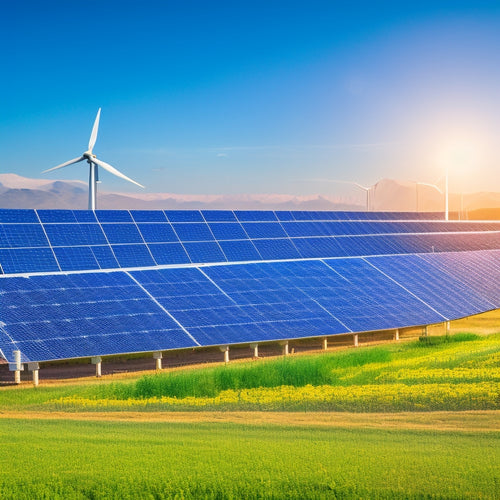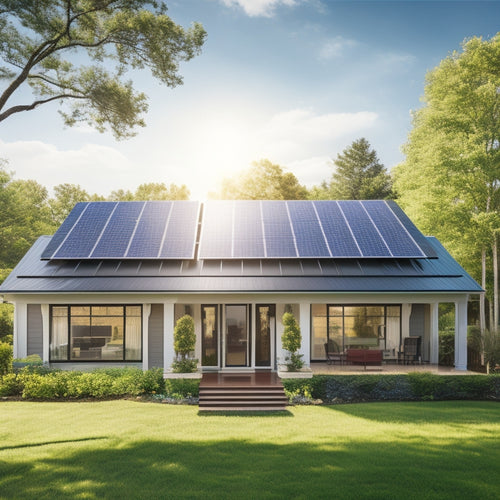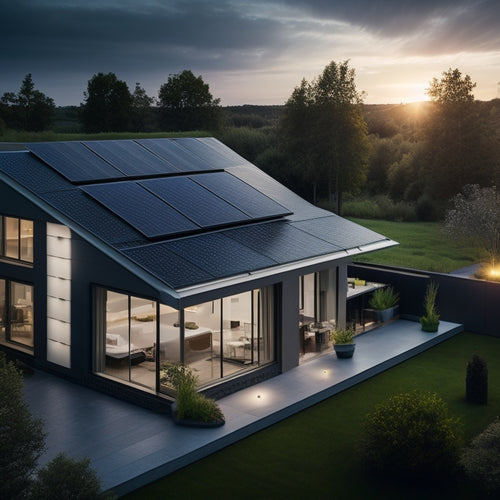
Empowering Home Energy Independence Made Easy
Share
By understanding your home's energy needs and utilizing the power of solar energy, you can take control of your energy independence, reduce your reliance on non-renewable sources, and save money on energy bills. Tracking your energy usage helps identify inefficiencies, and load forecasting predicts energy demands using historical data. Choosing the right solar panels and installing a well-designed system can maximize energy production. Energy storage and backup systems guarantee power supply continuity during outages. By optimizing energy efficiency and maintaining your solar power system, you can secure sustained energy independence. Now, learn how to make the most of your energy independence expedition.
Overview
- Understanding home energy needs through tracking and load forecasting enables identification of inefficiencies and optimization opportunities.
- Choosing the right solar panels with high efficiency rates and durable frames maximizes energy independence and reduces grid reliance.
- Energy storage systems and backup plans ensure power supply continuity during grid outages and emergencies, enhancing overall energy independence.
- Regular maintenance of solar power systems, including cleaning, inspection, and firmware updates, is crucial for sustained energy independence and efficiency.
- Real-time energy monitoring systems provide actionable insights to reduce energy waste, lower bills, and optimize energy efficiency.
Understanding Home Energy Needs
Your home's energy needs are as unique as its fingerprint, with varying patterns of consumption influenced by factors like climate, insulation, and occupant behavior. To achieve energy independence, you need to understand your energy consumption patterns. This involves tracking your energy usage over time to identify areas of inefficiency.
Evaluating energy demands accurately, utilize load forecasting to predict energy demands over time and analyze historical data and trends for accurate energy needs forecasting. You'll want to contemplate your energy-intensive appliances, lighting, and heating or cooling systems.
By analyzing your energy consumption, you can determine the best ways to reduce your reliance on non-renewable resources. This is where renewable resources come in – utilizing energy from sources like solar, wind, or geothermal can greatly decrease your energy bills and carbon footprint.
Choosing the Right Solar Panels
When selecting solar panels, you'll want to take into account panel efficiency, as it directly impacts how much energy your system can produce.
While high-efficiency panels may seem like the obvious choice, budget-friendly options can still provide a reliable source of energy.
Durable frames and weather-tight enclosures are also essential for longevity in various environmental conditions.
Panel Efficiency Matters
By the time you're ready to install solar panels, you've likely already considered factors like cost, durability, and aesthetics.
However, one vital aspect often overlooked is panel efficiency. This refers to a solar panel's energy conversion efficiency, which measures how well it converts sunlight into usable electricity.
Advanced solar panel technology has greatly improved energy conversion efficiency over the years, with high-efficiency silicon solar cells achieving conversion rates over 26% high-efficiency silicon and durable thin-film photovoltaics offering flexibility and reduced material consumption.
Look for panels with high efficiency ratings, typically above 20%. This means they can generate more power per hour of sunlight, resulting in more energy independence for you.
Higher efficiency panels may cost more, but they'll provide better performance and a faster return on investment.
When selecting solar panels, prioritize energy conversion efficiency to maximize your energy independence.
Budget-Friendly Options Exist
Several budget-friendly solar panel options are available for those seeking home energy independence, and they don't have to break the bank.
You can investigate community solar programs or energy co-ops, which allow multiple individuals or organizations to share the benefits of a single solar array.
Solar financing options also exist, providing access to affordable installations.
Consider prioritizing panel durability and evaluating the manufacturer's reputation to guarantee quality and reliability.
If you're handy, consider DIY installations to reduce labor costs.
Additionally, take advantage of solar incentives, such as energy audits and renewable rebates, to offset the upfront cost.
By leveraging these options, you can shift to green technologies without sacrificing your financial freedom.
With the right approach, you can achieve energy independence while staying within your budget.
Home Energy Monitoring Systems
How much energy is your home consuming at any given moment? With a home energy monitoring system, you can get real-time observations into your energy usage. These systems use smart meters and energy analytics to track your consumption patterns, providing data visualization and performance tracking. You can identify areas of inefficiency and make adjustments to reduce your energy bills.
| Feature | Benefit |
|---|---|
| Real-time monitoring | Identify energy-hungry appliances and adjust usage |
| Data visualization | Easily understand complex energy data |
| Energy audits | Pinpoint areas for improvement |
| User interfaces | Access energy data remotely |
| Cost savings | Reduce energy waste and lower bills |
Installing Solar Power Systems
Now that you've got a handle on your energy usage with a home energy monitoring system, it's time to think about generating some of that energy yourself.
Installing a solar power system is a key step towards home energy independence. The solar installation process typically begins with an assessment of your energy needs and a site evaluation to determine the best location for your solar panels.
You'll need to guarantee compliance with local regulations, such as obtaining necessary permits and meeting building codes. A professional solar installer can guide you through this process, helping you choose the right system size and configuration for your home.
With a well-designed solar power system, you'll be utilizing the sun's energy to power your home and reduce your reliance on the grid.
Energy Storage and Backup
With your solar power system in place, you're generating clean energy, but what happens when the grid goes down?
You'll want a reliable backup plan to power your home through outages, and that's where energy storage and backup systems come in.
These systems guarantee you have a steady supply of electricity, even when the grid isn't available.
Power Through Outages
During extended power outages, your home's energy independence can be severely compromised, leaving you reliant on external resources. You need a plan to power through outages and maintain control over your energy needs.
That's where solar outage strategies come in. By integrating energy storage and backup systems with your solar power setup, you can guarantee a steady supply of electricity even when the grid goes down.
With emergency power solutions, you can keep your lights on, your fridge running, and your communication devices charged. You'll be able to weather the storm in comfort, knowing your energy independence is secure.
Reliable Home Backup
By integrating energy storage and backup systems into your solar power setup, you guarantee a reliable home backup that keeps your essential appliances running smoothly, even when the grid fails.
This means you can power through outages without interruptions, ensuring your family's comfort and safety.
With advanced solar battery technology, you can store excess energy generated by your solar panels during the day for use at night or during grid outages.
This backup power solution provides peace of mind, knowing you're prepared for any situation.
Optimizing Energy Efficiency
Optimizing energy efficiency is vital to achieving home energy independence, as it enables you to reduce your reliance on external energy sources and minimize your environmental footprint.
Conducting energy audits helps identify areas of inefficiency, allowing you to prioritize upgrades like insulation, smart thermostats, and efficient appliances. By implementing these measures, you'll reduce energy consumption and lower your energy bills.
Additionally, incorporating renewable resources, such as solar or wind power, into your energy mix further decreases your reliance on external sources. Effective airflow management and sustainable practices also play an important role in energy conservation.
Maintaining Solar Power Systems
With your solar power system up and running, regular maintenance is vital to secure it continues generating electricity at its maximum potential.
You'll need to perform routine solar panel maintenance, including cleaning techniques to remove dirt and debris. Inverter upkeep is also essential, as it guarantees efficient energy conversion.
Monitor your system's performance regularly to identify any troubleshooting issues. Consider seasonal adjustments to optimize energy production.
Professional inspections can help identify areas for system upgrades, verifying warranty considerations are met.
By staying on top of maintenance, you'll experience efficiency improvements, maximizing your energy independence.
Stay proactive, and your solar power system will continue to generate clean, free energy for years to come.
Frequently Asked Questions
Can I Sell Excess Energy Back to the Grid?
You can sell excess energy back to the grid through net metering benefits, which track your production and consumption, and energy buyback programs, allowing you to offset your utility bills and even earn credits.
How Long Does It Take to Recoup My Solar Investment?
As you're generating excess energy, you're probably wondering when you'll break even. Coincidentally, your solar investment timeline aligns with your financial return expectations. Typically, it takes 5-7 years to recoup your costs, depending on your location and system size.
Are Solar Panels Resistant to Hail and Extreme Weather?
You'll be relieved to know that solar panels are designed to withstand hail and extreme weather, with most manufacturers subjecting them to rigorous testing, including hail impact and extreme temperature fluctuations, ensuring they'll keep generating power for you even in harsh conditions.
Can I Use Solar Power During a Grid Outage?
As darkness descends during a grid outage, you'll delight in finding that, yes, you can use solar power, thanks to off-grid systems paired with battery storage, which cleverly capture excess energy for later use, keeping your lights on and your freedom intact.
Do Solar Panels Void My Roof's Warranty?
You're wondering if solar panels void your roof's warranty. Typically, they don't, but you should verify the installation meets manufacturer-approved installation best practices to avoid roof warranty implications, maintaining your freedom from roofing concerns.
Ready to Buy
As you take control of your home energy independence, remember that every small step counts. Research suggests that for every dollar invested in energy efficiency, homeowners can expect a return of up to $4 in savings. By following these guidelines, you'll be well on your way to utilizing the power of the sun and reducing your reliance on the grid. With the right tools and knowledge, you'll be enabled to make a real difference in your energy consumption and your wallet.
Related Posts
-

The Role of Battery Monitoring Systems in Renewable Energy
Battery monitoring systems play an essential role in renewable energy by enhancing system longevity and optimizing pe...
-

Home Solar Installation Cost
You're considering installing solar panels on your home, and the upfront cost is likely the biggest hurdle standing i...
-

Home Solar Battery
You're opting for a home solar battery that allows you to utilize the power of the sun during the day and use it at n...


